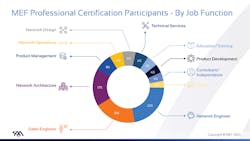Latest from Professional Development/Training
If You Train Them, They Might Just Stay
Upskilling Today’s Technology Professionals
Today’s work-from-anywhere world has elevated the need for new technologies to support secure, always-on, low-latency, and high-bandwidth requirements, and has generated tremendous job opportunities and the need for skilled technical professionals. Software and application developers, IT specialists, project managers, network and system engineers, and architects, well-versed in emerging technologies such as edge computing, SD-WAN, SASE, 5G, and IoT connectivity, are in high demand and critical to the success of advancing enterprise digital transformation.
The pace of change within the telecom industry and enterprises makes rightsizing of knowledge a complex challenge to solve. Qualified candidates are difficult to find, and the impact of the skills gap on organizations is substantial and growing. According to the PwC Pulse Survey: Executive views on business in 2022,1 three quarters of executives surveyed believe the ability to hire and retain talent is crucial to achieving growth. So much so that 60% of respondants plan to invest heavily in hiring and retaining talent this year.
In “The Great Resignation” era, training and development rise to the top as ways to keep top performers engaged and attract new top-notch employees, because employees with the right knowledge and skills are integral to business success. Companies recognize skills building as one of the best ways to close the gaps, and plan to make it more than a one-time investment. According to the report, more than 60% of companies have implemented increased upskilling opportunities.
Employees whose companies invest in learning and development feel valued and are less likely to leave. Recent research by Gallup,2 found that 65% of employees believe employer-provided upskilling is very important when evaluating a potential new job and 48% would be willing to switch jobs if offered skills training opportunities. On top of that, workers who participate in an upskilling program report an average salary increase of 8.6% higher than those who did not.
Companies that invest in employee skill-building programs build a reputation for supporting staff and their job satisfaction, improving both company culture and the external image of the brand, in turn, making it easier to attract and retain talent. Other benefits include the ability of employees to realize company strategy, and increased employee performance and productivity.
Where to Begin
A successful employee training and development program should align with business goals and the new technologies and solutions required to meet those goals. A skills gap analysis will map out core competencies, skills, and qualifications required for both current and prospective employees to fill immediate needs, optimize the use of existing talent, and enable the company to adapt to change. Identifying skills that will be needed over the next five years ensures the organization’s skills keep pace with the rapidly changing technology landscape.
A well-developed technical training program enables employees to build upon existing technical skills and stay current with rapidly emerging technologies. Learning resources, training programs and certification courses of all shapes and sizes are available to companies and don’t have to place a hefty time and financial burden on employees and employers. Many options exist to jump-start technical knowledge and proficiency.
- Live instructor-led training, one of the more traditional forms of training, can take place on-site or online through an accredited training partner. These training courses can be customized based on the skill level of learners and offer the ability to ask questions and have interactive discussions.
- Online learning options include formal and informal courses, and webinars hosted by domain experts, that range from introductory to advanced levels, and include self-study portals and customized e-learning approaches.
- Professional certifications offer credentials within a specific technical area (e.g., SD-WAN) and fosters continued technology proficiency growth and employee upskilling. Certification is a recognized benchmark mapped to a specific skill set based on standardized testing which enables employees to demonstrate acquired skills while providing measurable outcomes to their managers. Ninety-four percent (94%) of decision makers worldwide say that certified team members provide added value above and beyond the cost of certification, according to the Global Knowledge IT Skills and Salary Report.3 More than half of those surveyed estimate the annual economic benefit of a certified employee is greater than $10,000, and 16% say the benefit is $30,000 or higher. (See Figure 1.)
Not only do certified professionals have a competitive advantage over other professionals in their field but they help solve at least one of the technology industry’s biggest challenges for companies—experienced employees that have professional knowledge exceeding that of their competitors.
Benefits for Employees include:
- Gain a significant amount of technical knowledge.
- Improve technical communication with customers, prospects, and co-workers.
- Increase job proficiency, efficiency, and productivity with less reliance on technical support from other subject-matter experts.
- Increase credibility among peers and be validated as an industry expert in the workplace–an advantage for career advancement.
- Achieve a tangible commitment to continuing education and the desire to keep skills sharp.
Benefits for Companies include:
- Strengthen market position with proficient subject-matter experts.
- Better represent the competitive advantages of company solutions to customers and prospects.
- Improve ability to meet industry benchmarks and customer needs.
- More precisely design solutions that fit customer application requirements.
- Design and provision customer orders more accurately and timely.
- Improve technical communication among co-workers and company colleagues.
As technologies such as SD-WAN, SASE and edge compute become more critical to an organization's strategy, skilled professionals such as software and application developers, IT specialists, project managers, network and system engineers, and architects that are well-versed in the latest technical requirements, will be a critical component in high demand. The companies and professionals responsible for implementing these new services and technologies should consider professional training and certification options to bolster technical skills and proficiency. Emerging technologies can be complex to implement and integrate; training and certification provides assurance and evidence of essential knowledge and skills for the engineers, architects, and product managers charged with developing and deploying these solutions to demonstrate their expertise.
"Recent research by Gallup found that 65% of employees believe employer-provided upskilling is very important when evaluating a potential new job and 48% would be willing to switch jobs if offered skills training opportunities."
The advantages of certification for both employees and employers are clear. Certified technology professionals have greater earning potential and increased job satisfaction, and employers see a positive impact on the bottom line with more effective, efficient, and productive employees. Training and certifications allow employers to invest in developing needed skill sets in existing employees and attract new employees, helping to close skills gaps and increase employee loyalty and job satisfaction.
Consider enhancing your technical training and professional certification programs. As technologies rapidly evolve and become more complex, ensuring an organization’s workforce has the most up-to-date knowledge and training is a critical success factor. Professional certifications help organization’s close the skills gap, attract and retain employees, and stay competitive.
REFERENCES AND NOTES
1. https://www.pwc.com/us/en/library/pulse-survey/executive-views-2022.html
2. https://www.gallup.com/analytics/354374/the-american-upskilling-study.aspx
3. https://www.globalknowledge.com/us-en/content/salary-report/it-skills-and-salary-report/
ABOUT THE AUTHOR
Kirby Russell is Director, Professional Certification, MEF. He has more than 25 years’ experience in networking technologies, systems development, project management and marketing. He works with MEF network, cloud, and technology provider members to drive network transformation to power the digital economy. For more information, please email [email protected] or visit www.MEF.net. Follow Kirby on Twitter @kirbyrussellmef. Follow MEF on Twitter and LinkedIn @MEF_Forum, and YouTube: https://www.youtube.com/channel/UCduWoUHZdTbm4MqohUhllOw.
Kirby Russell | Director, Professional Certification, MEF
Kirby Russell is Director, Professional Certification, MEF. He has more than 25 years’ experience in networking technologies, systems development, project management and marketing. He works with MEF network, cloud, and technology provider members to drive network transformation to power the digital economy.
For more information, please email [email protected] or visit www.MEF.net. Follow Kirby on Twitter @kirbyrussellmef. Follow MEF on Twitter and LinkedIn @MEF_Forum, and YouTube: https://www.youtube.com/channel/UCduWoUHZdTbm4MqohUhllOw.





